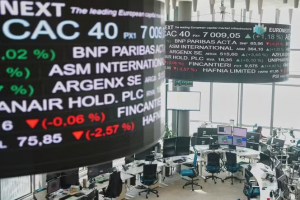| Peloton (NASDAQ:PTON) shares opened higher Thursday before giving up those gains and more after the company announced cost-cutting measures and a change in its top leadership. The fitness equipment and media company reported third-quarter earnings that fell short of analyst expectations by $0.09, posting an adjusted loss per share of -$0.45 compared to the estimated -$0.36. Despite this, revenue for the quarter was nearly in line with consensus estimates, totaling $717.7 million against an expected $718 million.
The company's revenue declined from the same quarter last year, when it reported $936.9 million, reflecting a challenging period for Peloton. However, Peloton's stock price jumped following the earnings release. The company's aggressive cost-cutting initiatives include a planned reduction of its global workforce by approximately 15% or around 400 employees. Additionally, Peloton announced that CEO Barry McCarthy would step down.
Peloton's restructuring efforts aim to reduce annual expenses by over $200 million by the end of its 2025 fiscal year, aligning costs with the current size of the business and positioning the company to generate sustained positive free cash flow. The company reported positive free cash flow for the first time in over three years, a significant milestone in its turnaround strategy.
For the full fiscal year 2024, Peloton has revised its revenue guidance downward to a range of $2.68-2.7 billion, slightly below the analyst consensus of $2.71 billion. This revised outlook takes into account current demand trends and expectations for seasonally lower demand in the fourth quarter.
In a statement, Peloton emphasized its commitment to providing the best fitness experience for its members and maintaining positive free cash flow over the long term. "We will continue to invest in innovation across our software, hardware, and content portfolio and in improvements to our Member support experience to meet the needs of current and future Members," said the company's management.
The company's cost restructuring program is expected to be substantially completed over the next 12 months, with full run-rate savings by the end of fiscal 2025. Peloton will also continue to reduce its retail showroom footprint and reimagine its international go-to-market approach.
Peloton's board members Karen Boone and Chris Bruzzo will serve as Interim Co-CEOs following McCarthy's departure. The company's focus on streamlining operations and improving its financial position appears to resonate with investors.
Following the report, analysts at BMO Capital said: "We continue to believe growth is behind us and focusing on bear-hugging brand loyalists/walking away from expensive growth hopes can improve FCF/EBITDA (seemingly happening). If that happens with new management, shares appear undervalued to us. If growth remains new management’s be-all-end-all, we worry about sustained FCF/looming debt questions."
Elsewhere, analysts at Needham & Company said that although PTON reached positive FCF in the quarter for the first time in three years and provided a significant beat on adjusted EBITDA, while increasing guidance for the year, they expect investor attention to be focused on CEO Barry McCarthy stepping down, the new $200 million restructuring plan and details on refinancing its debt.
"We suspect McCarthy stepping down will reignite investor speculation on strategic alternatives for the company," added Needham.













